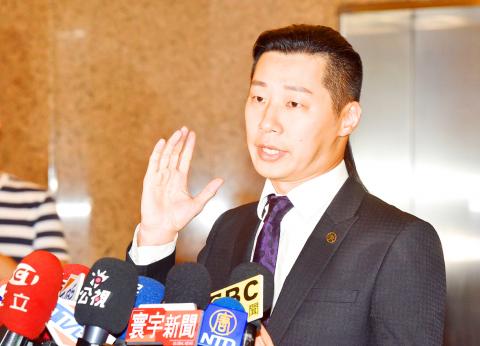New Power Party (NPP) Legislator Freddy Lim (林昶佐) yesterday said that he would leave the party to support President Tsai Ing-wen’s (蔡英文) re-election bid and expressed the hope that his departure would bring change to the party.
He said that he would run for re-election in Taipei’s Zhongzheng-Wanhua electoral district as an independent and would work with like-minded people across party lines to ensure that the Chinese Nationalist Party (KMT) does not win a legislative majority.
Lim made the announcement immediately after the NPP’s decisionmaking committee held an extraordinary meeting to discuss its strategies for next year’s presidential and legislative elections.

Photo: Tu Chien-jung, Taipei Times
Before the meeting, several party members had launched an internal petition calling for the NPP to rally behind Tsai, a Democratic Progressive Party (DPP) member, in the presidential election.
Some NPP members believe that the party should conduct a poll to determine its stance on the presidential election, because many supporters are fans of Taipei Mayor Ko Wen-je (柯文哲), Lim said.
“Four years ago, the NPP’s stance was that it would support Tsai for the sake of Taiwan’s sovereignty and at the same time work hard to keep her administration in check. Why can we not do that this time?” he asked.
He said that for years he has tried to resolve differences within the party about its strategies, but no consensus has been reached.
As the elections are just five months away, “if I cannot convince the party, I must move forward on my own path,” Lim said.
To ensure that the KMT does not gain a majority in the legislature, he said he would also try to coordinate with all pan-green parties to build a system in which there is only one pan-green candidate in each legislative constituency.
Asked if he would join the DPP or Ko’s new party, Lim said that he had no plans to join either.
Shortly after Lim’s announcement, NPP Legislator Hung Tzu-yung (洪慈庸) revealed that she and Lim had discussed leaving the party together.
“If things come to a point where a pro-China party could return to power and I must choose, I would leave without hesitation,” she said.
However, for now she would stay with the NPP to try and make a difference, she said.
Despite having different views on the party’s strategies, NPP members share the goal of keeping a local party in power and making the NPP “the key minority” in the legislature,” Hung said.
The committee has decided to work to ensure that the nation continues to be run by a local party and discuss with friendly parties about collaborating in the legislative elections, NPP Chairman Chiu Hsien-chih (邱顯智) said.
Chiu said that he had told Lim the committee would align with Lim’s goal, but Lim walked out of the meeting before it ended.
The NPP would not support a potential Ko bid for the presidency, because it is opposed to his cross-strait approach that “people on both sides of the Taiwan Strait are one family,” Chiu said, adding that the chance of the NPP nominating its own presidential candidate was “very small.”

A magnitude 7.0 earthquake struck off Yilan at 11:05pm yesterday, the Central Weather Administration (CWA) said. The epicenter was located at sea, about 32.3km east of Yilan County Hall, at a depth of 72.8km, CWA data showed There were no immediate reports of damage. The intensity of the quake, which gauges the actual effect of a seismic event, measured 4 in Yilan County area on Taiwan’s seven-tier intensity scale, the data showed. It measured 4 in other parts of eastern, northern and central Taiwan as well as Tainan, and 3 in Kaohsiung and Pingtung County, and 2 in Lienchiang and Penghu counties and 1

FOREIGN INTERFERENCE: Beijing would likely intensify public opinion warfare in next year’s local elections to prevent Lai from getting re-elected, the ‘Yomiuri Shimbun’ said Internal documents from a Chinese artificial intelligence (AI) company indicated that China has been using the technology to intervene in foreign elections, including propaganda targeting Taiwan’s local elections next year and presidential elections in 2028, a Japanese newspaper reported yesterday. The Institute of National Security of Vanderbilt University obtained nearly 400 pages of documents from GoLaxy, a company with ties to the Chinese government, and found evidence that it had apparently deployed sophisticated, AI-driven propaganda campaigns in Hong Kong and Taiwan to shape public opinion, the Yomiuri Shimbun reported. GoLaxy provides insights, situation analysis and public opinion-shaping technology by conducting network surveillance

Taiwan is gearing up to celebrate the New Year at events across the country, headlined by the annual countdown and Taipei 101 fireworks display at midnight. Many of the events are to be livesteamed online. See below for lineups and links: Taipei Taipei’s New Year’s Party 2026 is to begin at 7pm and run until 1am, with the theme “Sailing to the Future.” South Korean girl group KARA is headlining the concert at Taipei City Hall Plaza, with additional performances by Amber An (安心亞), Nick Chou (周湯豪), hip-hop trio Nine One One (玖壹壹), Bii (畢書盡), girl group Genblue (幻藍小熊) and more. The festivities are to

AFTERMATH: The Taipei City Government said it received 39 minor incident reports including gas leaks, water leaks and outages, and a damaged traffic signal A magnitude 7.0 earthquake struck off Taiwan’s northeastern coast late on Saturday, producing only two major aftershocks as of yesterday noon, the Central Weather Administration (CWA) said. The limited aftershocks contrast with last year’s major earthquake in Hualien County, as Saturday’s earthquake occurred at a greater depth in a subduction zone. Saturday’s earthquake struck at 11:05pm, with its hypocenter about 32.3km east of Yilan County Hall, at a depth of 72.8km. Shaking was felt in 17 administrative regions north of Tainan and in eastern Taiwan, reaching intensity level 4 on Taiwan’s seven-tier seismic scale, the CWA said. In Hualien, the